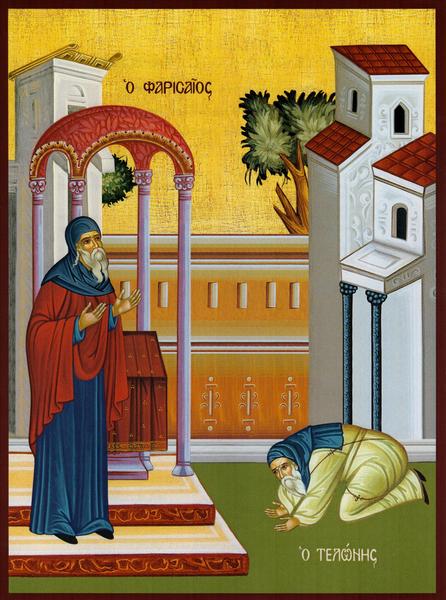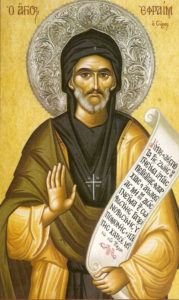During my time at Brite, I was once asked to preach the sermon in chapel. I decided to draw from the readings being used that week in the Orthodox Church. The Brite ensemble learned several Orthodox hymns and a couple of brave students learned chanting styles for the scripture readings. What follows is the sermon I offered the community that day.
In the name of the Father, and the Son, and the Holy Spirit – the Holy Trinity, One God, Mother of us all.[1]
Please be seated.
Welcome to our latest experiment in community worship. This week we’re incorporating elements from the Eastern Christian tradition, along with some Western contemplative settings. I want to thank our choir for being good sports as we have sung what might possibly be some of the most patriarchal language to be performed in this chapel in quite some time. The texts before the sermon have been presented in their typical forms for two reasons. First, Brite is an inclusive community that makes room for a variety of traditions. Second, I’d rather make space for a conversation around potentially problematic language than short circuit that process.

Today’s Gospel reading, the parable of the Publican and the Pharisee, is the appointed reading for the first week of the Triodion, a special liturgical book that is used beginning 10 weeks before Easter up to the Pascal celebration in the Orthodox liturgical calendar. While Eastern and Western celebrations of Easter occasionally coincide, this year Orthodox Christians will observe Pascha on April 8, one week after our co-religionists that use the Gregorian calendar.
Over the next three weeks, Orthodox parishes will visit three familiar readings. This past Sunday was the reading of the Publican and the Pharisee. Next week will be the Prodigal Son, followed by Judgment Sunday with the separation of the sheep and the goats. During this lead-up to Great Lent, we’ll take account of our relationships. We’ll ask for forgiveness and seek reconciliation where needed. And then we’ll enter Great Lent, a period marked by more intentional participation in prayer, fasting, and almsgiving.
Of course, the Orthodox don’t have a corner on these particular texts or practices. Growing up in the Southern Baptist Church, I heard the story of the Publican and the Pharisee many times. I suspect that for most gathered here it is also a familiar story. But familiarity can lull us into complacency. So let me try to frame the story in a more challenging way.
Now as a kid, I learned that publicans were bad. Zacchaeus was our example, and we found out that he didn’t just collect taxes, but that he also stole money from his fellow Jews.
But the characterization of the Pharisees was even more troubling. As a kid I learned that the Pharisees were Jesus’s enemies. They were legalistic. They were hypocrites. They antagonized Jesus and sought his crucifixion.
Characterizations of the Pharisees are even worse in my chosen Orthodox tradition. The name is bandied about as a shorthand for rigid legalists who quash the Spirit. They doggedly pursue the letter of the law, but they don’t understand why. Even Orthodox Christians who’ve gained some sensitivity around the anti-Semitic language of Orthodox paschal liturgies can still be guilty of using the term Phariseeism as a shorthand for various forms of conservatism, fundamentalism, or the zealotry associated with converts who strive to be more Orthodox than the Orthodox.
So if you’re anything like me, when you hear that a tax collector and a Pharisee walked up to the Temple to pray, your first impulse might be a knee-jerk reaction that the tax collector is the good guy and the Pharisee is automatically in the wrong. The challenge for me is checking myself, asking where I might fit in the story.
If we are to understand this story like someone in Jesus’s original audience, we first need to understand the social locations of the characters.
A publican collects taxes. In the first-century Palestinian context, the Romans set up a system of “tax farming.” They auctioned off contracts to wealthy publicans who would front the tax assessments. Then the publicans would recoup their investment and turn a huge profit by collecting more than they had originally paid out. In some locales, publicans would enlist the muscle of the military or police to extort money from the local populace.[2] A publican was a particular kind of traitor to his own people, working on behalf of a colonizing force that held the land and its people under the very real threat of violence, while stealing from his fellow countryman at the same time.
The Pharisees have become the foil of many Christian sermons. However, in their day they were devout Jews. They held no power in Jesus’s time. Their chief concern was with obeying God’s law as fully as possible. To this end, they studied the scriptures and created additional rules where the received commandments were unclear. Follow these rules, and you would most certainly fulfill God’s commands. On many points, Jesus and the Pharisees believed much the same thing. Elsewhere in the Gospels, Jesus even tells the crowds to do as the Pharisees say, but not as they do. Jesus lauded the Pharisees’ ideals, even as he criticized their methods and their strict adherence to purity codes.
So on the one hand, we have an upstanding, devout pillar of the local community. On the other, a thief and sell-out to imperial power. But like so many of the parables, these characters perform in ways that challenge the preconceptions Jesus’s listeners might bring to the story.
The Pharisee prays, thanking God that he’s not like other people. He’s not a thief, a rogue, an adulterer, or even like the tax collector. He fasts twice a week. He tithes on all of his income. He embodies the ideals of his religion. He’s a good guy.
I want to suggest that some of us might share the Pharisee’s foibles. We’re good guys too. We’re seminarians, leaders in our local churches, advocates for social justice. We recycle! We spend our money with local merchants! Some of us drive hybrids! We ask for and honor people’s pronouns! We’re woke! And we speak truth to power!
There’s nothing wrong with any of these things. Some of them can be quite good. The problem arises when we use our actions to justify ourselves, to separate ourselves from the bad guys, when we say – aloud or to ourselves – thank God I’m not like them…
Then there’s the tax collector. He can’t look toward heaven. Instead, he beats his chest and prays, “God, be merciful to me, a sinner!”
I want to pause here for a moment. Because some of us have a complicated relationship with sin. We may have painful memories. Some of us come out of rigid backgrounds where we just couldn’t measure up. Some of us fell in with the wrong crowd, or we broke a marriage vow. Some of us have a complicated relationship with drugs or alcohol. Some of us regret decisions we’ve made around unexpected pregnancies. Some of us love the wrong people. And as a result, many of us have struggled with the message that we are irredeemable sinners.
When I was in seminary, I was surprised by the number of my fellow students who’d say, “I don’t believe in sin.” For some this was a rejection of labels they’d previously worn. For others it was a rejection of doctrines like original sin or total depravity. “God called creation good,” they’d say. And “each of us is made in God’s own image.” “I don’t believe in original sin; I believe in original blessing.”
And while I largely agree with some of what my friends said, it seems to me that all we have to do is take an honest look at the world, at our local communities, at our very own divinity school, and at ourselves to see that there are areas for improvement. Places where we’ve missed the mark.
We may have more in common with the publican than we think. Each and every one of us finds ourselves bound up in systemic inequities and situations where there are no purely good choices. If nothing else, to live in the United States is to find oneself complicit with an imperial power that economically benefits from the labor of enslaved human beings both past and present. A power that consumes the world’s natural resources to fuel a consumerist economy. A power that pursues colonial ambitions and dictates policy around the globe. A power backed by the largest military the world has ever seen.
Yet even without pointing to our complicity with systemic sin, if we’re honest with ourselves we know that our daily lives are also marked by moments when we personally miss the mark.
As Jesus wraps up his story, it is the publican who goes down to his home justified, made right with God. And with customary pith, Jesus warns: “For all who exalt themselves will be humbled, but all who humble themselves will be exalted.” Our salvation comes not by comparing ourselves with others, but in recognizing our own shortcomings and bringing them before God.
 As we prepare to enter the Lenten season, I want to offer a resource from the Orthodox tradition. In your bulletins you will find the Lenten Prayer of St. Ephrem. It is a prayer that Orthodox Christians around the world pray, both individually and corporately, as one element in their Lenten spiritual practices. I invite you to use the prayer as you like during this season of reflection and repentance.
As we prepare to enter the Lenten season, I want to offer a resource from the Orthodox tradition. In your bulletins you will find the Lenten Prayer of St. Ephrem. It is a prayer that Orthodox Christians around the world pray, both individually and corporately, as one element in their Lenten spiritual practices. I invite you to use the prayer as you like during this season of reflection and repentance.
It goes like this:
O Lord and Master of my life, take from me the spirit of sloth, despair, lust of power, and idle talk.
But give rather the spirit of chastity, humility, patience, and love to Thy servant.
Yea, O Lord and King, grant me to see my own transgressions, and not to judge my brother, for blessed art Thou, unto ages of ages. Amen.
Change some words if you like. I haven’t removed any of the gendered references or the language of master and servant. But I see no reason why you can’t make thoughtful changes yourselves.
If it’s too much, try the publican’s prayer: “God, be merciful to me, a sinner.”
As we move into this season, my prayer for us all is that we’ll be attentive to the Spirit. That we not attempt to justify ourselves by what we have done or by comparing ourselves to others. Rather, may we be quick to admit when we fall short, and bold in asking forgiveness and God’s unmerited favor.
In the name of the Father, and the Son, and the Holy Spirit, Amen.
-----
[1] The final phrase invokes the Riverside solution, developed at Riverside Church of New York during the tenure of William Sloane Coffin.
[2] Spencer, Richard A. “Tax.” Eerdmans Dictionary of the Bible. Ed. David Noel Freedman. Grand Rapids: William B. Eerdmans Publishing Company, 2000, 1277-8.



